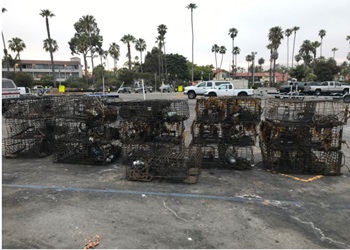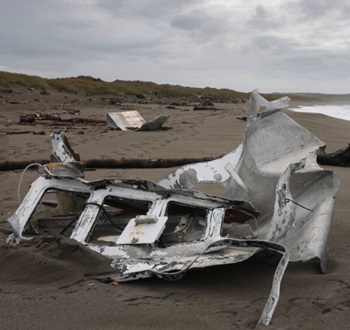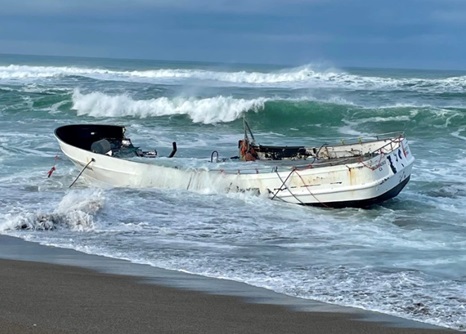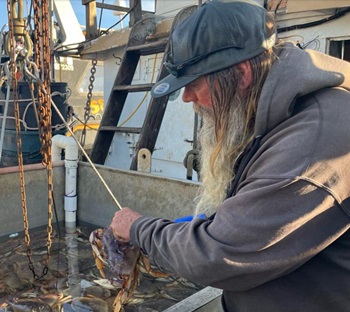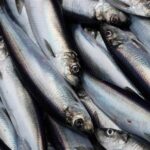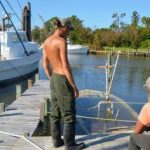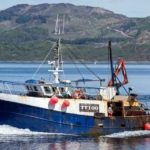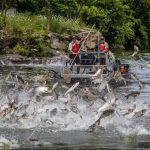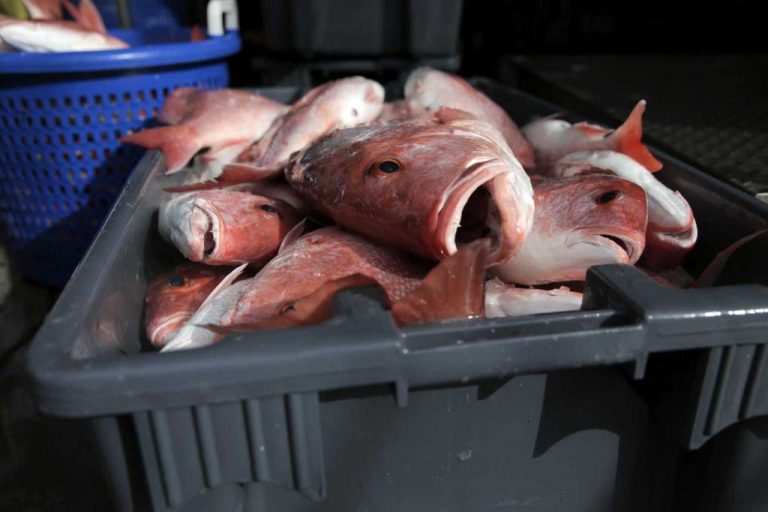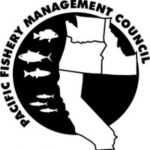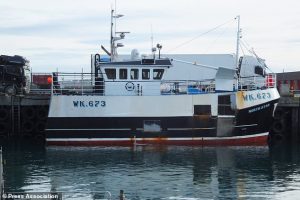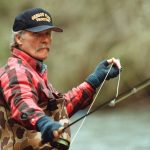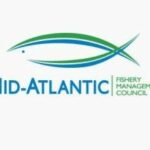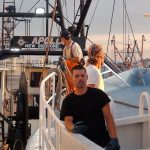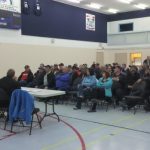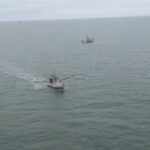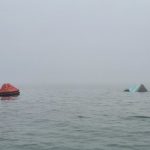Category Archives: Pacific
Retired Commercial Fisherman James Richard “Jim” Frederick of Anacortes, Washington, has passed away
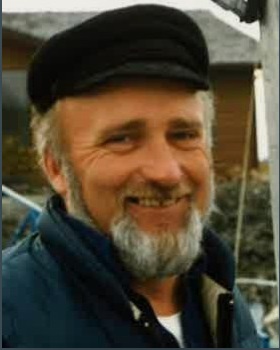 On Feb 25, 2024 Jim passed away peacefully at home with his wife Dorothy and son Jim Jr. at his side. He was born in 1933 in Michigan to become a lifelong fisherman. He and Dorothy married in 1953, when he was at Fr. Bragg in the 82nd Airborne Div. After his honorable discharge, with wife and son in tow, he left for Washington in 1960 in search of bigger fish, to which he dedicated his life and almost only topic of conversation. He retired from commercial fishing at age 78 (his call sign was affectionately known as “Grumpy”) and turned his attention to sport fishing and added another layer to his preferred topic of conversation. He will be sorely missed in this household. more, >>click to read<< 09:34
On Feb 25, 2024 Jim passed away peacefully at home with his wife Dorothy and son Jim Jr. at his side. He was born in 1933 in Michigan to become a lifelong fisherman. He and Dorothy married in 1953, when he was at Fr. Bragg in the 82nd Airborne Div. After his honorable discharge, with wife and son in tow, he left for Washington in 1960 in search of bigger fish, to which he dedicated his life and almost only topic of conversation. He retired from commercial fishing at age 78 (his call sign was affectionately known as “Grumpy”) and turned his attention to sport fishing and added another layer to his preferred topic of conversation. He will be sorely missed in this household. more, >>click to read<< 09:34
‘It’s really scary’: The existential crisis of a Bay Area crabber
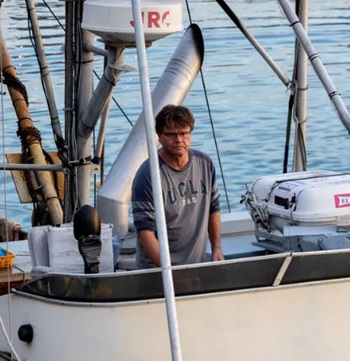 On a cloudy January evening, just as the sun lowered in the sky creating a sliver of orange along the horizon, John Mellor pulled his boat into the dock at Fisherman’s Wharf. Mellor’s 40-foot boat has been out at sea for more than 30 hours. There is a sense of excitement and anticipation as two crew members lift a cover, unveiling thousands of crabs in a container. Bucket by bucket, clawing crustaceans are weighed on a giant scale. The haul is a good one, and the success of each outing has become more crucial since the Dungeness crab season is half as long as it used to be. He waited through several anxious months of delays for the season to start. Mellor, 60, grew up in Oakland and began fishing as a teen. He is one of a few hundred commercial Dungeness crabbers in the state who have reluctantly adapted to shorter crabbing seasons. Photos, more, >>click to read<< 16:44
On a cloudy January evening, just as the sun lowered in the sky creating a sliver of orange along the horizon, John Mellor pulled his boat into the dock at Fisherman’s Wharf. Mellor’s 40-foot boat has been out at sea for more than 30 hours. There is a sense of excitement and anticipation as two crew members lift a cover, unveiling thousands of crabs in a container. Bucket by bucket, clawing crustaceans are weighed on a giant scale. The haul is a good one, and the success of each outing has become more crucial since the Dungeness crab season is half as long as it used to be. He waited through several anxious months of delays for the season to start. Mellor, 60, grew up in Oakland and began fishing as a teen. He is one of a few hundred commercial Dungeness crabbers in the state who have reluctantly adapted to shorter crabbing seasons. Photos, more, >>click to read<< 16:44
Inoperable weather buoys at mouth of the Columbia River stir concern
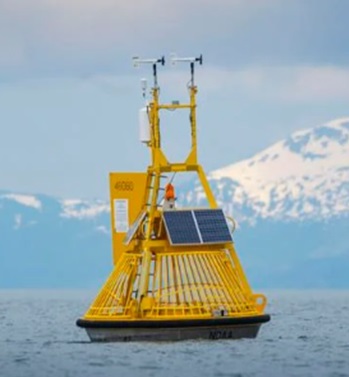 On the first day of commercial Dungeness crab season, Kelsey Cutting began his morning the way most crab fishermen do: checking the weather. Like many commercial fishermen, Cutting relies on data from weather buoys at the mouth of the Columbia River to guide his decisions. But as he’s learned, not all weather buoys are created equal — and when one goes out, there can be serious consequences. The National Oceanic and Atmospheric Administration operates two buoys at the mouth of the river that track real-time data on barometric pressure, wind direction, speed and gust, air and sea temperature, humidity and waves, which help inform National Weather Service forecasts. The buoys have been out of operation since late last year. more, >>click to read<< 15:18
On the first day of commercial Dungeness crab season, Kelsey Cutting began his morning the way most crab fishermen do: checking the weather. Like many commercial fishermen, Cutting relies on data from weather buoys at the mouth of the Columbia River to guide his decisions. But as he’s learned, not all weather buoys are created equal — and when one goes out, there can be serious consequences. The National Oceanic and Atmospheric Administration operates two buoys at the mouth of the river that track real-time data on barometric pressure, wind direction, speed and gust, air and sea temperature, humidity and waves, which help inform National Weather Service forecasts. The buoys have been out of operation since late last year. more, >>click to read<< 15:18
Hundreds of thousands of salmon released in Northern California river die in ‘large mortality’ event
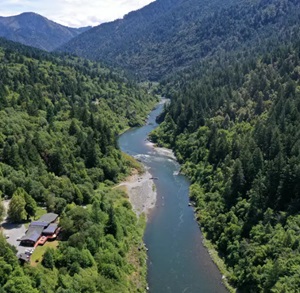 As many as hundreds of thousands of fall-run Chinook salmon died early last week due to suspected gas bubble disease. The fish were released into the 257-mile-long Klamath River near the California-Oregon border following November’s historic dam removal at the site, which was intended to help the stream flow freely again and bolster the habitat for the protected species. Still, the CDFW said those conditions, while unfortunate, were anticipated, and that its hatchery has over three million more salmon it plans to release later this month, downstream from the dam and tunnel. Juvenile fish like salmon fry can have high mortality rates due to predators, lack of food or disease, and the CDFW’s planned release will include fish in later stages of the species’ life cycle, specifically smolts and yearlings. more, >>click to read<< 09:28
As many as hundreds of thousands of fall-run Chinook salmon died early last week due to suspected gas bubble disease. The fish were released into the 257-mile-long Klamath River near the California-Oregon border following November’s historic dam removal at the site, which was intended to help the stream flow freely again and bolster the habitat for the protected species. Still, the CDFW said those conditions, while unfortunate, were anticipated, and that its hatchery has over three million more salmon it plans to release later this month, downstream from the dam and tunnel. Juvenile fish like salmon fry can have high mortality rates due to predators, lack of food or disease, and the CDFW’s planned release will include fish in later stages of the species’ life cycle, specifically smolts and yearlings. more, >>click to read<< 09:28
Coast Guard Refuses to Enforce California’s New Environmental Regulation
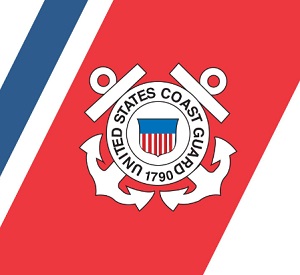 The state of California is once again proving that it is a far-left outlier, and now even the U.S. Coast Guard won’t enforce one of the state’s outrageous new regulations because of “safety concerns” waiting to befall ships at sea. The Coast Guard sent an official letter dated Feb. 21 to the California Air Resources Board to inform state officials that the branch will not penalize ships for lacking a new diesel exhaust particulate filter on their engines as required by a new state regulation. Adm. Sugimoto also pointed out that the diesel particulate filters (diesel exhaust particulate filter) called for by the CARB have not been approved for use by the Coast Guard or the federal government. more, >>click to read<< 07:06
The state of California is once again proving that it is a far-left outlier, and now even the U.S. Coast Guard won’t enforce one of the state’s outrageous new regulations because of “safety concerns” waiting to befall ships at sea. The Coast Guard sent an official letter dated Feb. 21 to the California Air Resources Board to inform state officials that the branch will not penalize ships for lacking a new diesel exhaust particulate filter on their engines as required by a new state regulation. Adm. Sugimoto also pointed out that the diesel particulate filters (diesel exhaust particulate filter) called for by the CARB have not been approved for use by the Coast Guard or the federal government. more, >>click to read<< 07:06
Commercial Fishermen in Alaska Find Suspected Spy Balloon, FBI Investigation Pending
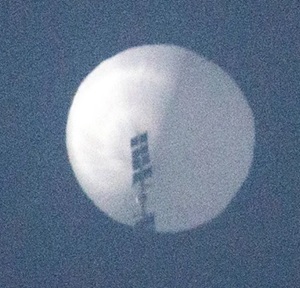 Commercial fishermen off the coast of Alaska have stumbled upon what could be a significant find—a suspected spy balloon, sparking immediate interest from U.S. officials. The object, believed to resemble those used in foreign surveillance activities, is now en route to the shore, escorted by the fishermen who discovered it. This incident has generated considerable attention, with the FBI preparing to conduct a thorough investigation upon its arrival. The unexpected discovery occurred when the fishermen noticed an unusual object floating off the coast. Initial photographs sent to local law enforcement caught the eye of federal officials, prompting an urgent request for the object to be brought to land. more, >>click to read<< 18:18
Commercial fishermen off the coast of Alaska have stumbled upon what could be a significant find—a suspected spy balloon, sparking immediate interest from U.S. officials. The object, believed to resemble those used in foreign surveillance activities, is now en route to the shore, escorted by the fishermen who discovered it. This incident has generated considerable attention, with the FBI preparing to conduct a thorough investigation upon its arrival. The unexpected discovery occurred when the fishermen noticed an unusual object floating off the coast. Initial photographs sent to local law enforcement caught the eye of federal officials, prompting an urgent request for the object to be brought to land. more, >>click to read<< 18:18
Vancouver Island fishermen to be honored for daring sea rescue
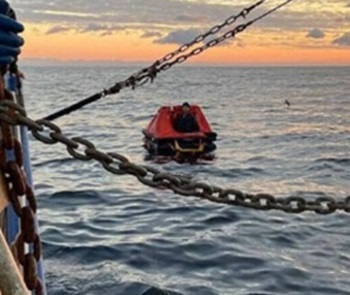 As Ryan Planes was in the middle of setting out his fishing gear off the West Coast of Vancouver Island in October, he noticed a bright orange speck about half a kilometre away. Upon first glance, he mistook it for ocean debris. Then, as he peered through his binoculars, he identified a life-raft, with a man waving a paddle, signalling for help. A few moments later, the man set off what was his last flare. The crew of five people on the Ocean Sunset, including Capt. John Planes (Ryan’s uncle), had found a mariner who had been adrift at sea on a life raft for almost two weeks. more, >>click to read<< 16:40
As Ryan Planes was in the middle of setting out his fishing gear off the West Coast of Vancouver Island in October, he noticed a bright orange speck about half a kilometre away. Upon first glance, he mistook it for ocean debris. Then, as he peered through his binoculars, he identified a life-raft, with a man waving a paddle, signalling for help. A few moments later, the man set off what was his last flare. The crew of five people on the Ocean Sunset, including Capt. John Planes (Ryan’s uncle), had found a mariner who had been adrift at sea on a life raft for almost two weeks. more, >>click to read<< 16:40
Athearn Marine Agency Boat of the Week: 74′ Steel Scalloper/Dragger, Caterpillar 3412
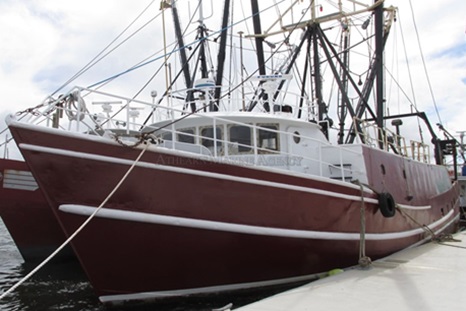 To review specifications, information, and 38 photos’,>click here<, To see all the boats in this series, >click here< 08:29
To review specifications, information, and 38 photos’,>click here<, To see all the boats in this series, >click here< 08:29
Endangered coho salmon: California’s comeback kid with ‘surprisingly strong’ spawning season, says NPS
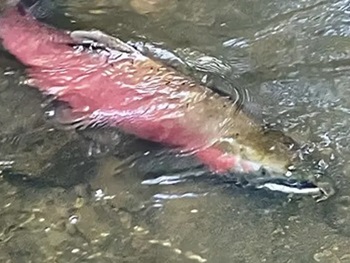 California’s coho salmon have made a surprising comeback. The 2023-24 spawning season is on track to be the best in more than 15 years, said the National Park Service in a statement. “On one of the creeks, Olema Creek, the one that we saw the most spawning on, we thought we’d see somewhere in the neighborhood of around 40 nests,” National Park Service Fishery Biologist Michael Reichmuth said. “And we’re looking at double that. So, that’s a pretty big surprise and encouraging to see those kinds of numbers because it means the fish had high survival through their life, getting to that point.” “We had an epic day on Olema, with a single-day count of 150 adult coho salmon. This is the highest single-day count that we have (ever) recorded,” he said. Video, photos, more, >>click to read<< 14:31
California’s coho salmon have made a surprising comeback. The 2023-24 spawning season is on track to be the best in more than 15 years, said the National Park Service in a statement. “On one of the creeks, Olema Creek, the one that we saw the most spawning on, we thought we’d see somewhere in the neighborhood of around 40 nests,” National Park Service Fishery Biologist Michael Reichmuth said. “And we’re looking at double that. So, that’s a pretty big surprise and encouraging to see those kinds of numbers because it means the fish had high survival through their life, getting to that point.” “We had an epic day on Olema, with a single-day count of 150 adult coho salmon. This is the highest single-day count that we have (ever) recorded,” he said. Video, photos, more, >>click to read<< 14:31
Oregon: Fishing group reacts to BOEM news on offshore wind
 Despite overwhelming opposition from tribes, fishing organizations and coastal communities, the Bureau of Ocean Energy Management (BOEM) announced the release of the final wind energy areas (WEAs) off Oregon’s south coast today. The WEAs remain unchanged from the draft areas released earlier this year. State agencies, fishermen, environmentalists, state legislators and others raised significant concerns about the draft WEAs, apparently to no avail. “This is a slap in the face to the many stakeholders who have been trying to engage with BOEM for the last few years,” said Heather Mann, Director of the Midwater Trawlers Cooperative. “BOEM is a rogue federal agency pushing a dangerous agenda largely unchecked. BOEM will stop at nothing until our oceans are littered with wind turbines and all just to meet an arbitrary political deadline.” more, >>click to read<< 10:24
Despite overwhelming opposition from tribes, fishing organizations and coastal communities, the Bureau of Ocean Energy Management (BOEM) announced the release of the final wind energy areas (WEAs) off Oregon’s south coast today. The WEAs remain unchanged from the draft areas released earlier this year. State agencies, fishermen, environmentalists, state legislators and others raised significant concerns about the draft WEAs, apparently to no avail. “This is a slap in the face to the many stakeholders who have been trying to engage with BOEM for the last few years,” said Heather Mann, Director of the Midwater Trawlers Cooperative. “BOEM is a rogue federal agency pushing a dangerous agenda largely unchecked. BOEM will stop at nothing until our oceans are littered with wind turbines and all just to meet an arbitrary political deadline.” more, >>click to read<< 10:24Assembly introduces bill to further restrict commercial fishing in California
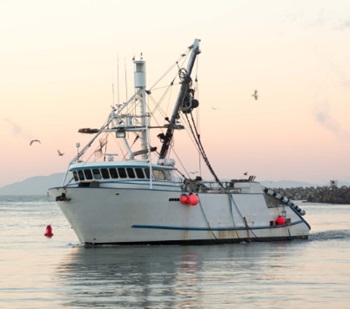 A new bill introduced in the California State Assembly would significantly limit gillnet fishing in the state, and end trafficking of certain species of fish. Would require the Department of Fish and Wildlife to adopt and enforce regulations requiring any commercial fishing vessel operating with a validly issued permit from the State to have an independent third party on board the vessel when operating within the State fishery. The party’s observer will need to be taken. The bill also states that all incidental exceptions to the catch of giant sea bass and great white sharks would also. A complete ban will be imposed on commercial fishing of both these species. Finally, the use of gill nets and gill nets will be completely banned in all ocean waters off California beginning January 1, 2025. more, >>click to read<< 15:38
A new bill introduced in the California State Assembly would significantly limit gillnet fishing in the state, and end trafficking of certain species of fish. Would require the Department of Fish and Wildlife to adopt and enforce regulations requiring any commercial fishing vessel operating with a validly issued permit from the State to have an independent third party on board the vessel when operating within the State fishery. The party’s observer will need to be taken. The bill also states that all incidental exceptions to the catch of giant sea bass and great white sharks would also. A complete ban will be imposed on commercial fishing of both these species. Finally, the use of gill nets and gill nets will be completely banned in all ocean waters off California beginning January 1, 2025. more, >>click to read<< 15:38
Bacher: CDFW salmon info webinar to discuss 2023 returns, 2024 ocean abundance estimates
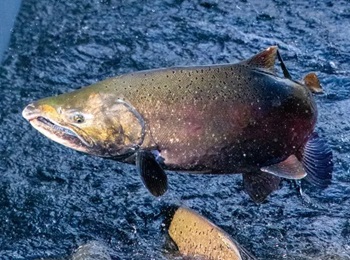 Will there be salmon seasons this year on the ocean waters off the California Coast and on the Sacramento and Klamath rivers? We will get an idea of the potential for recreational and commercial salmon seasons this year when the California Department of Fish and Wildlife (CDFW) holds its annual Salmon Information Meeting via webinar at 10 a.m. March 1. The meeting will provide informational presentations on topics including last year’s spawning escapement, estimates of forecasted ocean abundance and management goals for 2024 ocean salmon season. Last year all ocean recreational and commercial fishing and river recreational fishing for salmon was closed in California. more, >>click to read<< 07:58
Will there be salmon seasons this year on the ocean waters off the California Coast and on the Sacramento and Klamath rivers? We will get an idea of the potential for recreational and commercial salmon seasons this year when the California Department of Fish and Wildlife (CDFW) holds its annual Salmon Information Meeting via webinar at 10 a.m. March 1. The meeting will provide informational presentations on topics including last year’s spawning escapement, estimates of forecasted ocean abundance and management goals for 2024 ocean salmon season. Last year all ocean recreational and commercial fishing and river recreational fishing for salmon was closed in California. more, >>click to read<< 07:58
Washington attorney general charges seafood wholesaler with felonies over failure to report purchases
 Tacoma wholesale fish dealer Westlake Seafood has been charged with multiple felonies for allegedly failing to report thousands of dollars’ worth of sea urchin and Dungeness crab purchases to the Washington Department of Fish and Wildlife. The business, which operates a warehouse in the Dome District at 2615 E. N St., was formed in 2017 and on its website claims to export 90 percent of its live products to China and sell the rest in local and domestic markets. According to charging documents filed Thursday, an inspection of its warehouse and financial records in March last year discovered four unreported fish-receiving tickets amounting to $13,760.90 worth of purchases from fishermen. more, >>click to read<< 09:22
Tacoma wholesale fish dealer Westlake Seafood has been charged with multiple felonies for allegedly failing to report thousands of dollars’ worth of sea urchin and Dungeness crab purchases to the Washington Department of Fish and Wildlife. The business, which operates a warehouse in the Dome District at 2615 E. N St., was formed in 2017 and on its website claims to export 90 percent of its live products to China and sell the rest in local and domestic markets. According to charging documents filed Thursday, an inspection of its warehouse and financial records in March last year discovered four unreported fish-receiving tickets amounting to $13,760.90 worth of purchases from fishermen. more, >>click to read<< 09:22
Commercial Fisherman in Northern California Takes Legal Action to Challenge Dock Prices
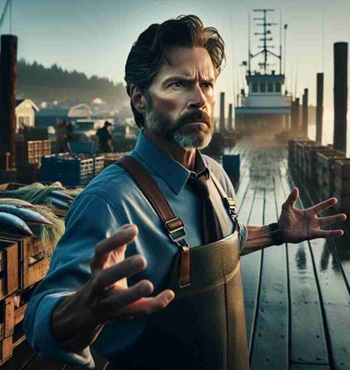 In the commercial fishing industry, rising costs, particularly fuel prices, have long been a major concern for fishermen across the United States. However, one commercial harvester in Northern California has taken a different approach to address the issue by bringing the matter to court. Recognizing the significant impact of dock prices on their livelihood, this fisherman has decided to challenge the current pricing structure through legal action. While many others have voiced their concerns about rising costs, this individual has taken a proactive stance by seeking legal remedies. By challenging the dock prices through legal means, this fisherman hopes to encourage a wider dialogue about the financial hardships faced by those in the fishing industry. more, >>click to read<< 07:59
In the commercial fishing industry, rising costs, particularly fuel prices, have long been a major concern for fishermen across the United States. However, one commercial harvester in Northern California has taken a different approach to address the issue by bringing the matter to court. Recognizing the significant impact of dock prices on their livelihood, this fisherman has decided to challenge the current pricing structure through legal action. While many others have voiced their concerns about rising costs, this individual has taken a proactive stance by seeking legal remedies. By challenging the dock prices through legal means, this fisherman hopes to encourage a wider dialogue about the financial hardships faced by those in the fishing industry. more, >>click to read<< 07:59
In crabbers’ turbulent moment, Edmonds seafood processor ‘saved our season’
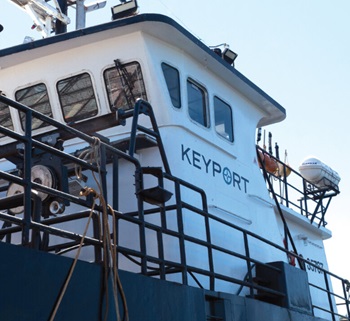 When a seafood processing plant in Alaska shut down in the middle of crabbing season, fishermen found themselves in a pinch. Under the state’s quota system, harvesters can only catch a set amount of crab each year. And they must deliver 90% of their catch to a processor with a corresponding quota With the Peter Pan Seafood facility closed this winter in King Cove, there was no one to process their catch. That’s when Keyport, an Edmonds-based company, stepped up to the plate. “When Peter Pan announced they were shutting down, a lot of fishermen came to us asking for help,” Keyport CEO Mark Pedersen said. more, >>click to read<< 16:18
When a seafood processing plant in Alaska shut down in the middle of crabbing season, fishermen found themselves in a pinch. Under the state’s quota system, harvesters can only catch a set amount of crab each year. And they must deliver 90% of their catch to a processor with a corresponding quota With the Peter Pan Seafood facility closed this winter in King Cove, there was no one to process their catch. That’s when Keyport, an Edmonds-based company, stepped up to the plate. “When Peter Pan announced they were shutting down, a lot of fishermen came to us asking for help,” Keyport CEO Mark Pedersen said. more, >>click to read<< 16:18
F/V Aleutian Storm: A Race Against Time for Salvage and Environmental Protection
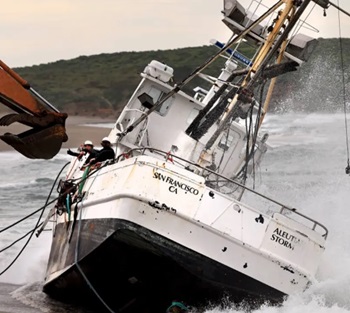 When the F/V Aleutian Storm, a 57-ton fishing vessel laden with Dungeness crab, ran aground at south Salmon Creek Beach on February 9th, it caught the attention of not just local authorities but also the concerned public eye. This wasn’t your ordinary maritime misadventure. The vessel, now a week into its ordeal, faces a grim future. Buffeted by relentless waves and ensnared by its own catch, the Aleutian Storm’s plight is a stark reminder of the ocean’s unforgiving nature. With salvage operations on the horizon, the clock ticks against both the vessel’s structural integrity and the environmental sanctity of the California coast. The community watches with bated breath as salvage operations prepare to unfold. The vessel’s fate hangs in the balance, with the risk of the ocean tearing it apart looming large. more, >>click to read<< 17:52
When the F/V Aleutian Storm, a 57-ton fishing vessel laden with Dungeness crab, ran aground at south Salmon Creek Beach on February 9th, it caught the attention of not just local authorities but also the concerned public eye. This wasn’t your ordinary maritime misadventure. The vessel, now a week into its ordeal, faces a grim future. Buffeted by relentless waves and ensnared by its own catch, the Aleutian Storm’s plight is a stark reminder of the ocean’s unforgiving nature. With salvage operations on the horizon, the clock ticks against both the vessel’s structural integrity and the environmental sanctity of the California coast. The community watches with bated breath as salvage operations prepare to unfold. The vessel’s fate hangs in the balance, with the risk of the ocean tearing it apart looming large. more, >>click to read<< 17:52
Retired Commercial Fisherman Darryl Olson of Petersburg, Alaska, has passed away
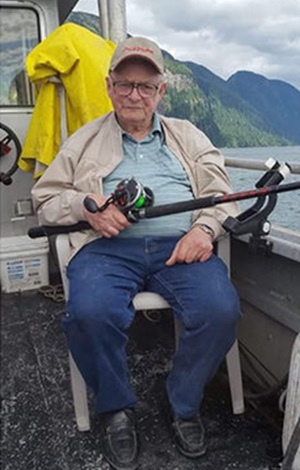 Darryl Olson was born on January 18, 1942, in Petersburg, Alaska, to Dagney Marie (Loseth) Olson and Paul “Bud” Ivar Olson. Darryl grew up fishing with his father, Paul. He attended Petersburg High School and after graduation he married his dream girl, Mary Ann Hasbrouck, on March 10, 1962. They were happily married for fifty-nine years, when she preceded him in death in 2021. He worked for J&H Logging as a choker setter until he started his career as a commercial fisherman. After leasing two boats, Darryl bought the F/V Miss Helen. In 1972, Darryl and Mary Ann began building their Petersburg home. That same year, Darryl purchased his dreamboat, the F/V Mary Ann, with the help of Robert Thorstenson and Tommy Thompson, of Petersburg Fisheries, Inc. more, >>click to read<< 10:45
Darryl Olson was born on January 18, 1942, in Petersburg, Alaska, to Dagney Marie (Loseth) Olson and Paul “Bud” Ivar Olson. Darryl grew up fishing with his father, Paul. He attended Petersburg High School and after graduation he married his dream girl, Mary Ann Hasbrouck, on March 10, 1962. They were happily married for fifty-nine years, when she preceded him in death in 2021. He worked for J&H Logging as a choker setter until he started his career as a commercial fisherman. After leasing two boats, Darryl bought the F/V Miss Helen. In 1972, Darryl and Mary Ann began building their Petersburg home. That same year, Darryl purchased his dreamboat, the F/V Mary Ann, with the help of Robert Thorstenson and Tommy Thompson, of Petersburg Fisheries, Inc. more, >>click to read<< 10:45
Sam Parisi asks, How Accurate is NOAA and NOAA Fishery Survey Science?
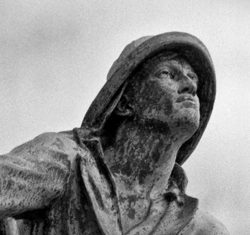 The agency is not required to compare their results with other independent science. The unproven science may bring concern on the health of fish stocks the industry depends upon. Our Fishermen and Fishing Industry depend on sound science. We need a Magnuson Act Amendment which would require NOAA to compare their science with other independent scientific surveys before any restrictions are placed on, or allocation cuts are enacted. Thank you, Sam Parisi. (click here to comment) 07:22
The agency is not required to compare their results with other independent science. The unproven science may bring concern on the health of fish stocks the industry depends upon. Our Fishermen and Fishing Industry depend on sound science. We need a Magnuson Act Amendment which would require NOAA to compare their science with other independent scientific surveys before any restrictions are placed on, or allocation cuts are enacted. Thank you, Sam Parisi. (click here to comment) 07:22Half Moon Bay Odd Fellows Speakers Series presents “Ernie Koepf – Fish Tales”
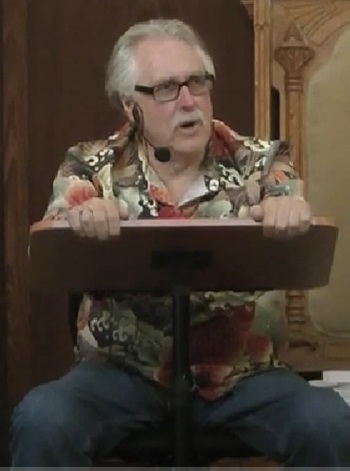 Much change has come about to Princeton and the fisheries of the West Coast. The history of the Coastside is also rich with change. Ernie Koepf is here to speak on both. Ernie Koepf was born (1951) and raised in Moss Beach and raised his own family in El Granada. He now resides in the hills of Oakland with his wife of 16 years, Jan Moestue. Early in his life he was initiated into the fishing community and was known as Little Ernie to his father’s Big Ernie, a prominent commercial fisherman in the community. Coming of age, Ernie Koepf (the junior) began his own fishing career. He retired in 2016 after fishing his two boats for 30 years for salmon and crab and 45 years for herring in SF Bay. To his fishing credits he also adds two years in Bristol Bay and two years in Southeast Alaska. VIDEO. From the Half Moon Bay Odd Fellows lecture presented and recorded on September 6th, 2024 at 7:00pm. more, >>click to read & watch<< 15:31
Much change has come about to Princeton and the fisheries of the West Coast. The history of the Coastside is also rich with change. Ernie Koepf is here to speak on both. Ernie Koepf was born (1951) and raised in Moss Beach and raised his own family in El Granada. He now resides in the hills of Oakland with his wife of 16 years, Jan Moestue. Early in his life he was initiated into the fishing community and was known as Little Ernie to his father’s Big Ernie, a prominent commercial fisherman in the community. Coming of age, Ernie Koepf (the junior) began his own fishing career. He retired in 2016 after fishing his two boats for 30 years for salmon and crab and 45 years for herring in SF Bay. To his fishing credits he also adds two years in Bristol Bay and two years in Southeast Alaska. VIDEO. From the Half Moon Bay Odd Fellows lecture presented and recorded on September 6th, 2024 at 7:00pm. more, >>click to read & watch<< 15:31
Crab gear reduction for commercial fishers extended through mid-March
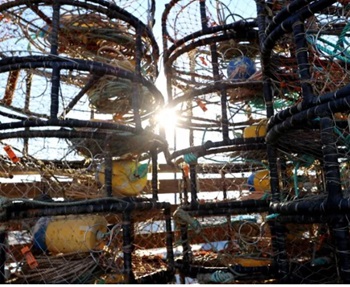 Less than a month after the commercial Dungeness crab season opened in the Monterey Bay region, the California Department of Fish and Wildlife (CDFW) has extended the gear reduction in all fishing zones south of the Mendocino/Sonoma County line. “It’s about the minimum we can survive on viably,” fisher Tim Obert told Lookout in January. Obert is a Santa Cruz native who has fished commercially for more than two decades. He serves as president of the Santa Cruz Commercial Fishermen’s Association and sits on the state’s Dungeness Crab Task Force. more, >>click to read<< 10:42
Less than a month after the commercial Dungeness crab season opened in the Monterey Bay region, the California Department of Fish and Wildlife (CDFW) has extended the gear reduction in all fishing zones south of the Mendocino/Sonoma County line. “It’s about the minimum we can survive on viably,” fisher Tim Obert told Lookout in January. Obert is a Santa Cruz native who has fished commercially for more than two decades. He serves as president of the Santa Cruz Commercial Fishermen’s Association and sits on the state’s Dungeness Crab Task Force. more, >>click to read<< 10:42
Eric’s Heroes: The 50-year journey of fisherman Pete Knutson
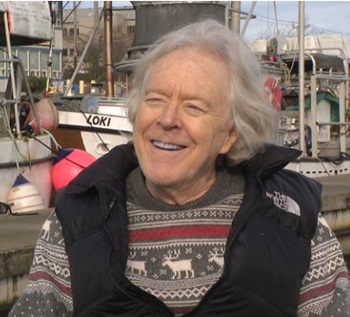 A fisherman with long, gray hair looks out at this beautiful place and takes a sip from his coffee mug. The fisherman is Pete Knutson. The place is Fisherman’s Terminal. Each has left their mark on the other. Don’t be fooled by how gorgeous it is. Fisherman’s Terminal, plopped right in the middle of a major metropolitan city, is a place for men and women who understand work. People who fish for a living. “It always felt RIGHT,” he says. “It always felt like a place that I was comfortable. I like the people. I’ve always liked the people in the fishing. They’re really direct, you know? It’s honest work.” Pete has been a fisherman for 50 years. He’s gone to Alaska to ply his trade, four or five months every summer, for half a century. Video, 17 photos, more, >>click to read<< 10:46
A fisherman with long, gray hair looks out at this beautiful place and takes a sip from his coffee mug. The fisherman is Pete Knutson. The place is Fisherman’s Terminal. Each has left their mark on the other. Don’t be fooled by how gorgeous it is. Fisherman’s Terminal, plopped right in the middle of a major metropolitan city, is a place for men and women who understand work. People who fish for a living. “It always felt RIGHT,” he says. “It always felt like a place that I was comfortable. I like the people. I’ve always liked the people in the fishing. They’re really direct, you know? It’s honest work.” Pete has been a fisherman for 50 years. He’s gone to Alaska to ply his trade, four or five months every summer, for half a century. Video, 17 photos, more, >>click to read<< 10:46
Oregon fishermen, tribes angered by surprise announcement on offshore wind energy areas
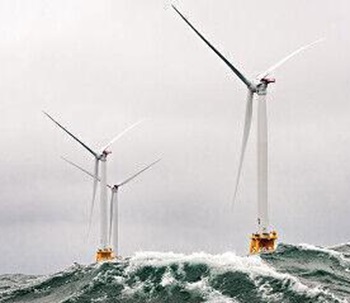 Federal officials say Oregon’s wind energy areas were developed “following extensive engagement and feedback from the state, Tribes, local residents, ocean users, federal government partners, and other members of the public” and are based on reducing conflicts with ocean users, particularly commercial fishermen. The areas avoid 98% of the locations recommended for exclusion due to their importance as commercial fishing grounds, they said. But local groups representing fishermen and Indigenous communities said that narrative is inaccurate and the federal government’s engagement with local communities was perfunctory at best, failing to take into account suggested impacts on local fishing areas, the environment and views that are sacred to tribes. The groups said the announcement caught them by surprise since Gov. Tina Kotek had asked the federal agency last June to pause identifying and leasing offshore wind areas so the state could fully evaluate potential impacts on the environment and economy. more, >>click to read<< 10:07
Federal officials say Oregon’s wind energy areas were developed “following extensive engagement and feedback from the state, Tribes, local residents, ocean users, federal government partners, and other members of the public” and are based on reducing conflicts with ocean users, particularly commercial fishermen. The areas avoid 98% of the locations recommended for exclusion due to their importance as commercial fishing grounds, they said. But local groups representing fishermen and Indigenous communities said that narrative is inaccurate and the federal government’s engagement with local communities was perfunctory at best, failing to take into account suggested impacts on local fishing areas, the environment and views that are sacred to tribes. The groups said the announcement caught them by surprise since Gov. Tina Kotek had asked the federal agency last June to pause identifying and leasing offshore wind areas so the state could fully evaluate potential impacts on the environment and economy. more, >>click to read<< 10:07
The St. Jude Is One of Seattle’s Last Commercial Tuna Boats
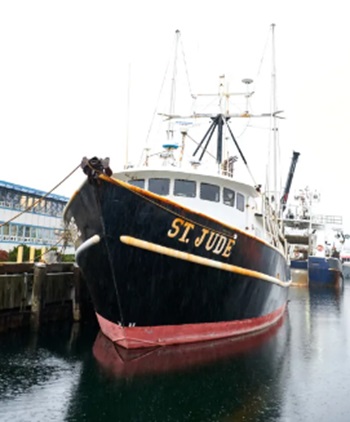 It’s a Monday afternoon and Fishermen’s Terminal in Ballard is relatively empty. A man pulls into the parking lot in a minivan and snakes his way over speed bumps to the water’s edge, where he stops alongside a battered-looking boat. After hopping onto the deck and exchanging a few words and some cash with the boat’s all-Fijian crew, he gingerly packs a whole flash-frozen albacore tuna into a Styrofoam container, places it in his trunk, and glides away. The transaction has the air of a secret. But it isn’t one. The St. Jude has been trolling for albacore in the Pacific for 35 years, and its owners, Joe and Joyce Malley, have been selling their catch off the boat intermittently since 1999. Photos, more, >>click to read<< 09:52
It’s a Monday afternoon and Fishermen’s Terminal in Ballard is relatively empty. A man pulls into the parking lot in a minivan and snakes his way over speed bumps to the water’s edge, where he stops alongside a battered-looking boat. After hopping onto the deck and exchanging a few words and some cash with the boat’s all-Fijian crew, he gingerly packs a whole flash-frozen albacore tuna into a Styrofoam container, places it in his trunk, and glides away. The transaction has the air of a secret. But it isn’t one. The St. Jude has been trolling for albacore in the Pacific for 35 years, and its owners, Joe and Joyce Malley, have been selling their catch off the boat intermittently since 1999. Photos, more, >>click to read<< 09:52
F/V Aleutian Storm: Coast Guard working to free 57-ton fishing boat grounded near Bodega Bay
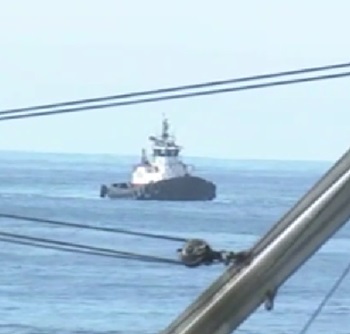 The Coast Guard says the vessel ran aground during rough seas Friday night. The ‘re-floating’ mission is urgent before the boat becomes a pollution hazard from leaking fuel. By air, land and sea, there’s a major operation happening on a Sonoma County beach. Dozens of people working to get the 58-foot Aleutian Storm back into the Pacific. Trouble is, she’s stuck in several feet of sand. The Coast Guard said the plan Monday was to attach a tow line between to the Aleutian Storm and a tug boat offshore and pull her off the beach when the tide comes in. Video, more, >>click to read<< 07:15
The Coast Guard says the vessel ran aground during rough seas Friday night. The ‘re-floating’ mission is urgent before the boat becomes a pollution hazard from leaking fuel. By air, land and sea, there’s a major operation happening on a Sonoma County beach. Dozens of people working to get the 58-foot Aleutian Storm back into the Pacific. Trouble is, she’s stuck in several feet of sand. The Coast Guard said the plan Monday was to attach a tow line between to the Aleutian Storm and a tug boat offshore and pull her off the beach when the tide comes in. Video, more, >>click to read<< 07:15
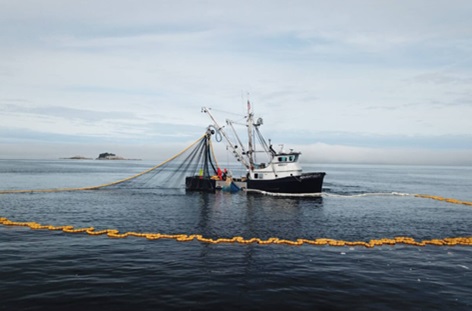
The Adventurous life of commercial fishing
With crabbing season just around the corner, the five-person crew of the fishing vessel Adventurous is about to embark. Led by owner and captain Shon Landon, they face brutally long days prepping and converting the ship from its role as a salmon seiner for the summer season to an efficient crabber for the winter. There is both anticipation and excitement at the start of a new season; a successful haul involves planning, reviewing data, strategic decision-making, skilled teamwork, and a splash of luck. In a word, it is truly adventurous. While Landon does not hail from generations of fishermen, he still came into the industry at a young age, taking on his first job on a troller at just 12 years old. His family had moved up to Alaska after his father took a job in the logging industry. When Landon later got a job seine fishing on another vessel, he knew he had found his true passion. Photos, more, >>click to read<< 18:09
Our Fragile Oceans: Is It Too Late to Rethink Floating Wind Turbine Power Off Our California Coastline?
 On January 24, 2024, Democrat Congressman Jared Huffman gave a speech in Humboldt County applauding the securing of $426 million federal grant dollars for the establishment of floating wind farming turbines off the Humboldt County coastline. Local leaders, commissions, private and public businesses, and the indigenous community seemed to be onboard. East coast fishermen recently have been battling the establishment of wind powered generators along their coastline. Many claim that these wind turbines will effectively ruin the oceanic fisheries along the east coast of the United States. One also must question the ultimate expanse of such an infrastructure rollout. That said, my preliminary ballpark calculations (with a continuous high level of efficiency of the turbine units) could only provide a range of 0.7% to 3.0% of the needs of California households (under the current grants) and that would exclude any commercial usage. more, >>click to read<< by Jeff Wyles 11:43
On January 24, 2024, Democrat Congressman Jared Huffman gave a speech in Humboldt County applauding the securing of $426 million federal grant dollars for the establishment of floating wind farming turbines off the Humboldt County coastline. Local leaders, commissions, private and public businesses, and the indigenous community seemed to be onboard. East coast fishermen recently have been battling the establishment of wind powered generators along their coastline. Many claim that these wind turbines will effectively ruin the oceanic fisheries along the east coast of the United States. One also must question the ultimate expanse of such an infrastructure rollout. That said, my preliminary ballpark calculations (with a continuous high level of efficiency of the turbine units) could only provide a range of 0.7% to 3.0% of the needs of California households (under the current grants) and that would exclude any commercial usage. more, >>click to read<< by Jeff Wyles 11:43






